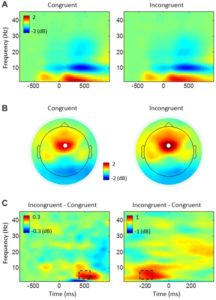Improve Brain Processing of Cognitive Conflict with Mindfulness
By John M. de Castro, Ph.D.
“Mindfulness should no longer be considered a “nice-to-have” for executives. It’s a “must-have”: a way to keep our brains healthy, to support self-regulation and effective decision-making capabilities, and to protect ourselves from toxic stress. When we take a seat, take a breath, and commit to being mindful, particularly when we gather with others who are doing the same, we have the potential to be changed.” – Christina Congleton
There is a tremendous amount of information present at any moment. It is a challenge to the nervous system to sort it out and pay attention to only the most significant information. This involves ignoring competing or conflicting stimuli and concentrating on only the most salient and pertinent stimuli. Mindfulness training can help. It involves a greater emphasis on attention to the immediate stimulus environment. So, it builds the capacity to focus on what is transpiring in the present moment. Mindful people generally have better attentional abilities and have fewer intrusive thoughts and less mind wandering. As a result, mindfulness has been shown to be associated with differences in thought processes.
One indirect method to monitor cognitive functions is through recording the electrical signals from the brain with the electroencephalogram (EEG). Electrical activity occurring at different frequencies is representative of the nature of the activity in the underlying brain tissue. The theta rhythm occurs in the frequency region of 4-7 cycles per second (Hz.). Recordings of Theta, particularly in the frontal regions of the brain have been shown to increase when attention is focused and mind wandering is minimized. Hence, the effects of mindfulness practice on the nervous may be seen in alterations to the Theta Rhythm in the frontal areas of the brain and the structures connected to them.
In today’s Research News article “Frontal Theta Dynamics during Response Conflict in Long-Term Mindfulness Meditators.” See summary below or view the full text of the study at: https://www.ncbi.nlm.nih.gov/pmc/articles/PMC5461248/, Jo and colleagues recruited adult long-term (> 5 years) meditators (average 13.1 years) and non-meditators matched on gender and age. All participants had EEGs recorded while performing a flanker task, a measure of executive cognitive function, in which the participant has to respond to the direction of an arrow, when it is surrounded by distracting arrows that point either in the same (no-conflict) or opposite (conflict situation) directions.
They found that the meditators responded more accurately on the flanker task, making significantly fewer errors, particularly when the conflict situation was present. Hence, meditators demonstrated superior cognitive control and attentional ability. The Theta Rhythm power over the frontal areas was found to be higher for both groups during the conflict but not the no-conflict situation. The synchrony of the Theta Rhythm over the frontal areas and especially between the frontal areas and the motor cortex was greater for both groups during the conflict situation, but was significantly greater in the meditators. In addition, the greater the level of synchronization during the conflict situation the fewer the error made on the flanker task.
These are interesting results and suggest that long-term meditation practice enhances the individual’s cognitive and attentional ability particularly when conflicting stimuli are present. In addition, long-term meditation practice appears to alter the frontal areas of the nervous system enhancing their ability to resolve conflicts. So, meditation practice improves the brain and as a result the meditators cognitive attentional processing.
So, improve brain processing of cognitive conflict with mindfulness.
“Importantly, research has shown mindfulness to increase activity in brain areas associated with attention and emotion regulation. Mindfulness also facilitates neuroplasticity — the creation of new connections and neural pathways in the brain.” – Carolyn Gregoire
CMCS – Center for Mindfulness and Contemplative Studies
This and other Contemplative Studies posts are also available on Google+ https://plus.google.com/106784388191201299496/posts and on Twitter @MindfulResearch
Study Summary
Jo, H.-G., Malinowski, P., & Schmidt, S. (2017). Frontal Theta Dynamics during Response Conflict in Long-Term Mindfulness Meditators. Frontiers in Human Neuroscience, 11, 299. http://doi.org/10.3389/fnhum.2017.00299
Abstract
Mindfulness meditators often show greater efficiency in resolving response conflicts than non-meditators. However, the neural mechanisms underlying the improved behavioral efficiency are unclear. Here, we investigated frontal theta dynamics—a neural mechanism involved in cognitive control processes—in long-term mindfulness meditators. The dynamics of EEG theta oscillations (4–8 Hz) recorded over the medial frontal cortex (MFC) were examined in terms of their power (MFC theta power) and their functional connectivity with other brain areas (the MFC-centered theta network). Using a flanker-type paradigm, EEG data were obtained from 22 long-term mindfulness meditators and compared to those from 23 matched controls without meditation experience. Meditators showed more efficient cognitive control after conflicts, evidenced by fewer error responses irrespective of response timing. Furthermore, meditators exhibited enhanced conflict modulations of the MFC-centered theta network shortly before the response, in particular for the functional connection between the MFC and the motor cortex. In contrast, MFC theta power was comparable between groups. These results suggest that the higher behavioral efficiency after conflicts in mindfulness meditators could be a function of increased engagement to control the motor system in association with the MFC-centered theta network.
